#HolocaustRemembrance
Text

15th April 1945 - despite being badly beaten by guards, this Jewish woman somehow manages a smile on being liberated from Bergen-Belsen by allied forces. Our thanks to Tom Marshall, who colourised the photograph in 2020.
Likud Herut UK
98 notes
·
View notes
Text

Holocaust Remembrance Day! Never Forget, Never Again! #NeverAgainIsNow
#yom hashoah#HolocaustRemembrance#israel#idf#israel defense forces#am yisrael chai#pray for israel#antisemitism#shoah#jerusalem
49 notes
·
View notes
Text
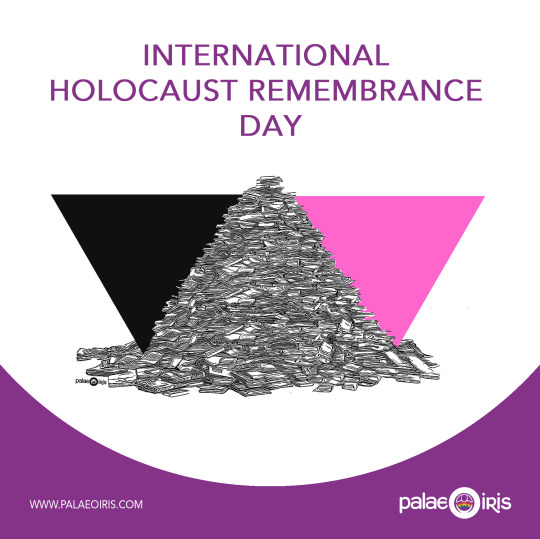

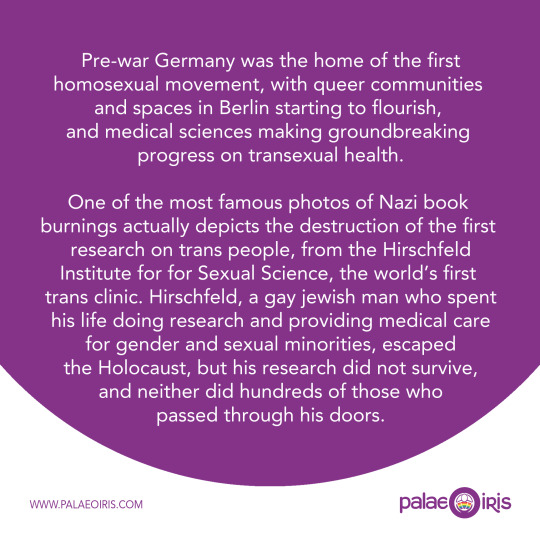

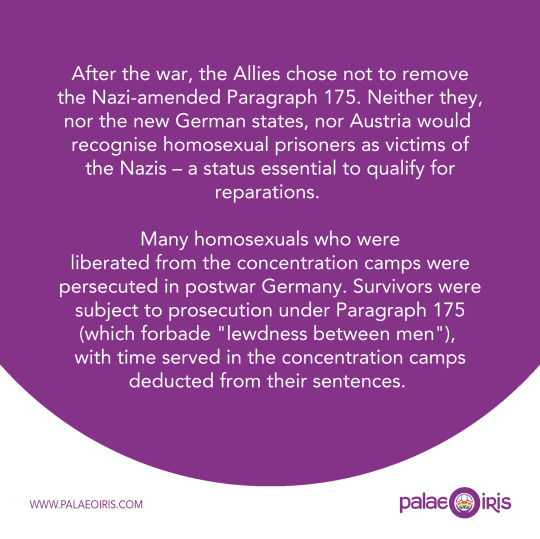
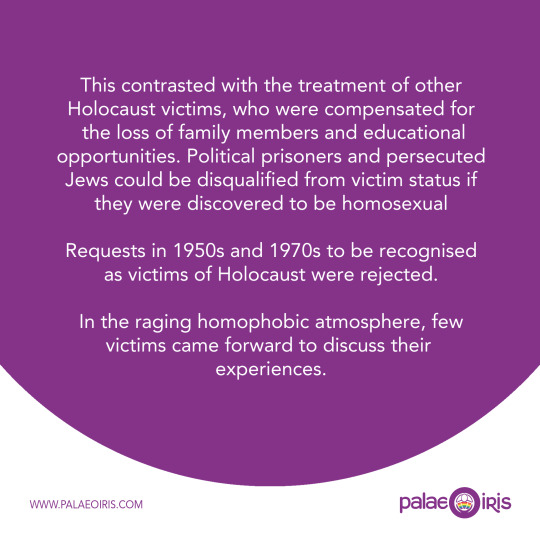

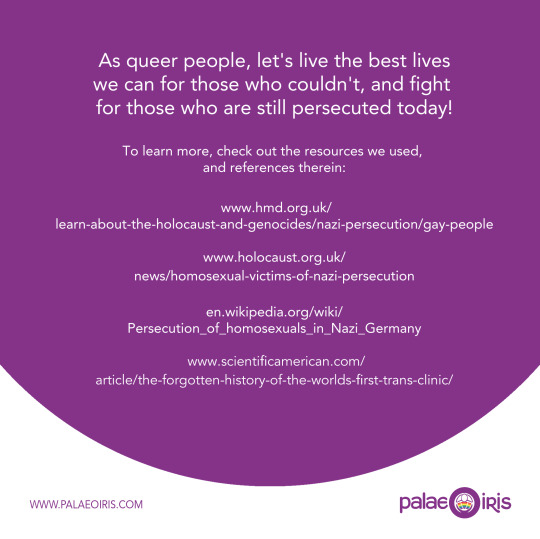
International Holocaust Remembrance Day commemorates the anniversary of the liberation of Auschwitz-Birkenau concentration camp by the Red Army in 1945. Today we remember millions of victims of the Nazi regime, including those that have often been missing when talking about the victims.
Gay men, lesbians and trans people were sent into concentration camps, marked by the pink or black triangles, tortured, kept in inhumane conditions, worked to death and exterminated, along with jewish people, romani, disabled people, socialists, communists, Slavs, and others.
On these slides we will quickly cover queer prosecution by Nazis, as well ways in which for them the discrimination didn't end with the Holocaust.
#HolocaustRemembrance#HolocaustRemembranceDay#queervictimsofHolocaust#queerholocaustmemory#queerholocausthistory#queerholocaustmemorial#pinktriangle#blacktriangle#Nazibookburnings#HirschfeldInstitute#HolocaustMemorialArt#HolocaustMemorialDayArt#queerholocaustart#originalartwork#Holocaust Remembrance Day#queer history#queer victims of Holocaust#Queer Holocaust Memory#Queer Holocaust history#Queer holocaust memorial#pink triangle#black triangle#Hirscfeld institute
42 notes
·
View notes
Text

Likud Herut UK
78 notes
·
View notes
Text
In Memory of Emanuel Ringelblum for his work saving photos, stories, and the history of Jews in Warsaw during the Holocaust. Never forget.

2 notes
·
View notes
Text
Human Rights and the Israel-Palestine Conflict: A Historical and Contemporary Perspective
The Universal Declaration of Human Rights (UDHR), adopted by the United Nations General Assembly on December 10, 1948, is a fundamental milestone in the protection of human rights globally. Inspired by the atrocities committed during World War II, including the Holocaust, the UDHR aims to ensure dignity, freedom, and equality for all human beings. However, ongoing human rights violations in the context of the Israel-Palestine conflict highlight the challenges of implementing these universal principles in prolonged and complex conflicts.
Historical Context and the Drafting of the UDHR
The Holocaust was a catastrophic event that exposed the extent of human brutality when basic rights are not respected. Six million Jews, along with millions of other victims, were systematically murdered by the Nazi regime. This genocide triggered a moral and political response globally, leading to the creation of the United Nations and the drafting of the UDHR. The document was a commitment by the international community to prevent future atrocities and ensure that human dignity is universally respected.
Fundamental Principles of the UDHR
The principles of the UDHR include universality and equality, the prohibition of torture and inhumane treatment, and the right to life and personal security. These principles were established to protect individuals against oppression and tyranny, reflecting the lessons learned from the Holocaust.
1. Universality and Equality: The UDHR proclaims that all human beings are born free and equal in dignity and rights. This principle aims to combat all forms of discrimination, such as racism and xenophobia, which were prominent features of the Holocaust.
2. Prohibition of Torture and Inhumane Treatment: Torture and cruel, inhumane, or degrading treatment or punishment are explicitly prohibited by the UDHR. This principle reflects the need to protect individuals against inhumane practices like those inflicted during the Holocaust.
3. Right to Life and Personal Security: The right to life, liberty, and personal security is a cornerstone of the UDHR, reaffirming protection against genocides and mass killings.
The Israel-Palestine Conflict and Human Rights
The Israel-Palestine conflict, which intensified after the creation of the State of Israel in 1948, is marked by numerous human rights violations. The tensions between Israelis and Palestinians have resulted in countless deaths, forced displacements, and inhumane living conditions for many Palestinian civilians. Analyzing the practices and policies adopted in this context reveals serious concerns regarding the principles of the UDHR.
1. Violence and Security: Continuous violence, including bombings, blockades, and confrontations, results in numerous human rights violations of Palestinians. The right to life and personal security is often compromised, with civilians being victims of military actions and terrorist attacks.
2. Inequality and Discrimination: Palestinians face systematic discrimination in various areas, including access to resources, employment opportunities, and freedom of movement. These practices violate the principle of universality and equality of the UDHR.
3. Torture and Inhumane Treatment: Reports of torture, mistreatment, and inhumane living conditions in the occupied Palestinian territories are clear examples of human rights violations that the UDHR seeks to prevent. Administrative detention and blockades affecting millions of Palestinians are frequently criticized by human rights organizations.
Global Commitment and Challenges
The international community, by adopting the UDHR, committed to preventing atrocities and protecting human rights. However, the situation of Palestinians shows that there is still a long way to go to ensure the implementation of these principles in conflict contexts.
1. International Intervention: The UN and other international organizations play a crucial role in attempting to mediate peace and resolve conflicts, including the Israeli-Palestinian issue. However, the effectiveness of these interventions is often limited by political and geostrategic factors.
2. Accountability and Justice: It is essential to hold all parties accountable for human rights violations. The application of international justice can help prevent future abuses and promote reconciliation.
3. Education and Awareness: Promoting human rights education and awareness about the importance of the UDHR is fundamental to building a culture of respect and protection of human rights.
Conclusion
The Universal Declaration of Human Rights, born from the ashes of the Holocaust, establishes an essential standard for the dignity and rights of all human beings. The Israel-Palestine conflict underscores the importance and challenges of applying these universal principles in conflict contexts. The international community must continue to work to ensure that human rights are respected and protected, learning from history to build a more just and humane future. The defense of human rights is a collective responsibility that requires continuous action and global commitment.
texto elaborado com inteligência artificial por um humano
#HumanRights hashtag#UDHR#hashtag#IsraelPalestineConflict#HolocaustRemembrance#UniversalRights#GlobalJustice#PeaceAndSecurity#EndDiscrimination#RightToLife#StopViolence#ProtectHumanDignity#NeverAgain#EqualityForAll#TorturePrevention#InternationalLaw#Peacebuilding#HumanRightsEducation#GlobalCommitment#Accountability#LearnFromHistory
0 notes
Text
International Holocaust Remembrance Day
On International Holocaust Remembrance Day, let's unite for a future of compassion, understanding, and hope. 🌟💖
0 notes
Text
Dieses Flugblatt verteilte die AG »No Tears for Krauts« am 27. Januar 2024 bei der vom Bündnis »Halle gegen Rechts« veranstalteten Kundgebung zum Holocaust-Gedenktag unter dem Motto: »Nie wieder ist jetzt – Never again is now« (Marktplatz Halle):
𝐍𝐢𝐞 𝐰𝐢𝐞𝐝𝐞𝐫 𝐃𝐞𝐮𝐭𝐬𝐜𝐡𝐥𝐚𝐧𝐝!
𝐍𝐢𝐞 𝐰𝐢𝐞𝐝𝐞𝐫 𝐆𝐚𝐳𝐚!
Als am Morgen des 7. Oktobers tausende Hamaskämpfer den Grenzzaun zu Israel überwanden, um Juden auf denkbar barbarischste Weise zu töten, zu vergewaltigen und zu entführen, wurden sie von wiederum tausenden Einwohnern Gazas begleitet, die die Gelegenheit nutzten, um ihre jüdischen Nachbarn ebenfalls auszuplündern und fürchterlich zu schänden. Dieser Tag war mit Abstand der schlimmste Tag für die Juden, nicht nur Israels sondern der ganzen Welt, seit dem Ende des Holocausts. Und nicht nur das: Hätten die Palästinenser noch größere militärische Möglichkeiten gehabt, als sie ohnehin schon hatten, und hätte ihnen nicht eine der schlagkräftigsten Armeen des Nahen Ostens auf israelischer Seite gegenübergestanden, wäre die so oft zitierte Singularität des Holocausts so singulär gar nicht geblieben. Mit anderen Worten: Es bestand am 7. Oktober und es besteht auch weiterhin die reale Gefahr eines neuen Holocausts. Genau vor diesem Hintergrund entstand der Slogan „Never again is now!“ – als explizite Solidarisierung mit dem Überlebenskampf des jüdischen Staates. Und es gibt genügend Gründe an einer Solidarisierung mit den Juden und ihrem Staat festzuhalten: Die Hamas ist noch nicht vernichtet, Gaza ist noch längst nicht reeducated, die Geiseln sitzen nach wie vor in den Tunneln Gazas und werden dort systematisch misshandelt. Inwiefern sich die Situation im Norden mit der Hisbollah zuspitzt, ist derzeit nicht absehbar. Und dass es über kurz oder lang Krieg mit dem Mullahregime im Iran geben wird, ist ebenfalls sehr wahrscheinlich. Die Juden an amerikanischen Universitäten sind genauso gezwungen sich bedeckt zu halten wie die Juden, die noch immer in islamischen Gebieten wie Marokko, der Türkei oder Neukölln leben. Never again is now!
Dies alles sind aber keine Gründe dafür, dass die Menschen im besten Deutschland aller Zeiten gegen den grassierenden Antisemitismus auf die Straße gehen. Wenn das Kasperletheater vom Bündnis Halle gegen Rechts zum Jahrestag der Befreiung von Auschwitz zur Demonstration mobilisiert, geht es freilich nicht um die Bedrohung der lebenden Juden, sondern um die eigene Agenda, die sich natürlich nur gegen Rechts zu richten habe. Ganz ohne Scham nimmt man den Slogan der Solidaritätswelle für Israels Existenzkampf und deutscht ihn umstandslos ein, indem man das „Never again is now“ gegen irgendwelche Vollhorste der AfD wendet. Bereits auf der Großdemonstration von Halle gegen Rechts am letzten Samstag wurde völlig geschichtsvergessen die Rechts-Partei als Neugeburt der NSDAP dargestellt; ganz so als ob Weidel und co schon Listen mit deutschen Juden anlegen würden. Völlig ohne Realitätsprüfung, ob denn tatsächlich „AfD wählen so 1933“ sei, wie es gerne auf den Anti-AfD-Aufmärschen heißt, demonstriert man mit den Ortsverbänden jener Parteien, die entweder als Ampel oder eben als CDU-Regierung, wesentlich mitverantwortlich dafür sind, dass die AfD überhaupt so einen Zulauf hat. Deren Wähler dürften nicht durchweg rassistisch oder fremdenfeindlich sein, sondern zu einem nicht unerheblichen Teil aus jenen Bevölkerungsteilen bestehen, die sich von den Bevormundungen und Belehrungen der Altparteien nicht so gerne abholen lassen, wie jene, die im Staatsauftrag gegen einen Rechtsruck auf die Straße gehen, den man sich zurechtlügen muss, um über den eigenen Mist nicht reden zu müssen. Dass man dabei dann nicht nur mit Parteivertretern fast jeder Couleur demonstriert, sondern sich mit der notorisch israelfeindlichen Islamischen Gemeinde Halle, dem Queers for Palestine-Ableger Kohsie e.V. und dem Arabischen Haus auch noch die größten Feinde des jüdischen Staates ins Deutsch-Arabische Haus holt, ist dabei kaum verwunderlich. Im Aufruf von Halle gegen Rechts ist man sich zudem nicht zu blöd, den „Opfern des deutschen Faschismus“ zu gedenken; ganz so als habe der „deutsche Faschismus“ und nicht Millionen von Deutschen ihre jüdischen Nachbarn denunziert, ausgeraubt, verhaftet, deportiert und zusammen mit möglichst vielen anderen Juden Europas, derer man habhaft werden konnte, systematisch vernichtet. Besondere Brisanz für das diesjährige Gedenken an den Holocaust hat zudem ein Umstand, der in den letzten Wochen für die größte Mobilisierung des guten Deutschlands seit Jahrzehnten gesorgt hat: Ein Treffen von AfD-Sympathisanten, die sich irgendwo in einer Brandenburger Landgaststätte widerlichen Omnipotenzphantasien hingegeben haben, wie sie Nicht-Deutsche unter Ausnutzung bestehender Gesetze loswerden können.
Abgesehen von nun nicht gerade für ihr „Vordenken“ bekannten Posterboys der Identitären Bewegung mussten zumindest wir die anderen Mitglieder dieses Treffens googeln, da diese gar nicht so mächtig und bekannt sind, wie die Enthüllungsjournaille in ihren Texten nahelegte. Unterm Strich war dieses Treffen natürlich eine schlimme Horrorshow; als großen Umsturzplan oder als Zeichen eines schlimmen Rechtsrucks lässt sich diese Veranstaltung kaum aufblasen. Ein gefundenes Fressen für das gute Deutschland, das weder über linken noch islamischen Antisemitismus reden will, ist es aber allemal.
Während die AfD zum Wiedergänger der NSDAP aufgenordet wird und sich der antifaschistische Mob in Stellung bringt, um zu zeigen, was die eigenen Urgroßeltern hätten tun sollen (*), ist das Schweigen zum Neuversuch des Holocausts im Nahen Osten bezeichnend. Never again is now ist keine Wohlfühlparole von den Nachkommen der Nazis, mit der man sich als die besseren Deutschen gerieren kann. Sondern nach wie vor eine Kampfansage an die Antisemiten in Gaza und auf der ganzen Welt. Auf Solidarität aus Deutschland können sich die Juden weder in Israel noch in Neukölln verlassen. Daher sei noch einmal eindringlich darauf hingewiesen, was „never again is now“ konsequent zu Ende gedacht bedeutet:
Nie wieder (rechtes oder linkes) Deutschland!
Nie wieder Gaza!
Solidarität mit Israel!
Waffen für die IDF!
𝐀𝐆 »𝐍𝐨 𝐓𝐞𝐚𝐫𝐬 𝐟𝐨𝐫 𝐊𝐫𝐚𝐮𝐭𝐬«
𝟐𝟕. 𝐉𝐚𝐧𝐮𝐚𝐫 𝟐𝟎𝟐𝟒
* Es ist nicht genau klar, was die Demonstranten meinten, die auf Plakaten fordern, dass man zeigen solle, was die Urgroßeltern hätten tun sollen: Will man, wie die Urgroßeltern, die unliebsame Opposition verbieten? In Großdemonstrationen Feinde benennen und ausgrenzen? Gegner mundtot machen und aus dem öffentlichen Raum entfernen? Also letztlich den Großeltern nacheifern?
0 notes
Text
Holocaust Remembrance Day 2024
On this International Holocaust Remembrance Day 2024, we solemnly reflect on the atrocities of the past, shedding tears for the millions who suffered unimaginable horrors. Let us vow never to forget, tirelessly working towards a world where such atrocities are inconceivable. May the memory of the Holocaust inspire compassion, understanding, and a collective commitment to ensure that such darkness never engulfs humanity again.

#HolocaustRemembrance#NeverForget#RememberingThePast#HolocaustMemorial#RemembranceDay#NeverAgain#HumanRights#Tolerance#EducateToPrevent#HonorTheSurvivors#HolocaustEducation#StandAgainstHate#GenocideAwareness#UnityInDiversity#LessonsFromHistory#WitnessToHistory#HolocaustSurvivors#RespectAndReflect#HumanityPrevails#GlobalMemory#today on tumblr#new blog
0 notes
Photo
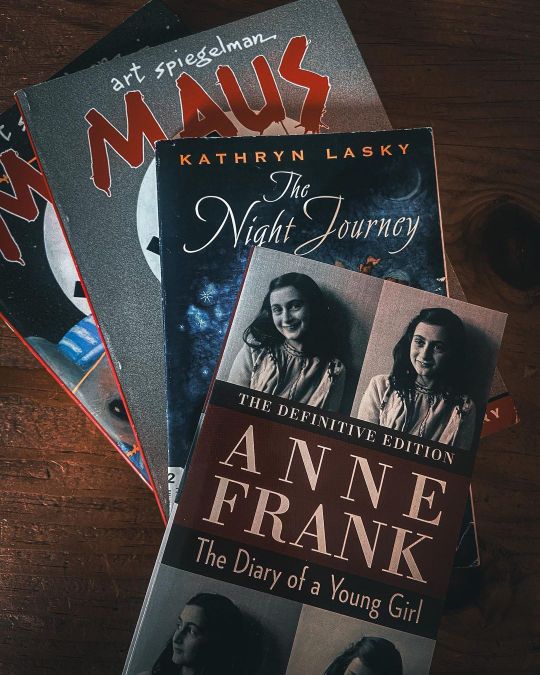
January 27th is International Holocaust Remembrance Day. The UN General Assembly designates this day back in 2005 with the purpose of commemorating the victims of the Holocaust as well as to promote education on the Holocaust world wide. These are a few books from my shelves about the Holocaust. Pictured: Maus I&II by Art Spiegelman. The author tells his grandfather’s story in comic book format The Night Journey by Kathryn Lasky: A teenage girl spends time with her great-grandmother who begins to tell her the story of her childhood as a young Jewish girl in Russia Anne Frank - needs no introduction. Not pictured: The Book Thief by Marcus Zusak I will be posting a list of other books related to the Holocaust that are in my TBR which I hope is useful to you as well in your reading. Is there any related reading you recommend? #holocaustremembranceday #holocaust #holocaustremembrance #holocaustbooks #bookstagram #bookblogger #theresabookforthat #thenightjourney #maus #kathrynlasky #artspiegelman #annefrank #recommendedreading #tbr #books #reading #readmorebooks https://www.instagram.com/p/CoBwe2vLt7q/?igshid=NGJjMDIxMWI=
#holocaustremembranceday#holocaust#holocaustremembrance#holocaustbooks#bookstagram#bookblogger#theresabookforthat#thenightjourney#maus#kathrynlasky#artspiegelman#annefrank#recommendedreading#tbr#books#reading#readmorebooks
0 notes
Text

Yom HaShoah begins this evening (17-4-2023)
278 notes
·
View notes
Photo

Today is Intl Holocaust Remembrance Day.
We solemnly remember the horrors of the Holocaust. We Honor the six million Jews and millions of Slavs, Roma, LGBT persons, and persons with disabilities who were murdered by the Nazis.
Visit Us.
0 notes
Photo

Es casi imposible imaginar los horrores que experimentaron las familias #judías en toda Alemania, Austria y los Sudetes en esta noche hace 84 años cuando los nazis desataron un frenesí de #antisemitismo. Las sinagogas fueron quemadas hasta los cimientos, los Rollos de la Torá profanados, los hogares y negocios judíos destruidos, las personas asesinadas en la calle simplemente porque eran judías. Al día siguiente, cientos habían sido asesinados, y miles más quedaron en la indigencia y sin hogar. Más de 30.000 hombres judíos fueron detenidos y enviados a campos de concentración. Así comenzó el capítulo más oscuro de la historia judía. #Kristallnacht #HolocaustRemembrance #NeverAgain https://www.instagram.com/p/CkvdaExON7O/?igshid=NGJjMDIxMWI=
0 notes
Text

It is almost impossible to imagine the horrors experienced by Jewish families across Germany , Austria and the Sudetenland on this night 84 years ago as the Nazis unleashed a feeding frenzy of antisemitism. Synagogues were burnt to the ground, Torah Scrolls desecrated, Jewish homes and businesses destroyed, people murdered in the street simply because they were Jewish. By the following day, hundreds had been killed, with thousands of others left destitute and homeless. Over 30,000 Jewish men were rounded up and sent to concentration camps. Thus began the darkest chapter in Jewish history.
Likud UK
104 notes
·
View notes
Video
Attend President Joe Biden's State of the Union Speech, #shorts
1 note
·
View note
